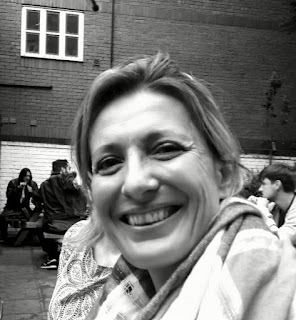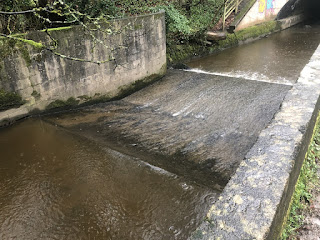Interview with Sara Clowes, Chair and Host of the Weaver Gowy and Douglas Catchment Partnerships
This week I invited my colleague, Sara Clowes, for an interview. As you will read below, I came up with some questions to ask Sara about her role in conservation. In the future, I hope to conduct more interviews with intention of discovering the different types of jobs in conservation. I want to find out what people do, what motivates them and how they ended up doing what they’re doing. So if you’re considering getting into conservation, or are simply just intrigued about the type of work involved in conservation, this is a blog for you.
I hope you enjoy the interview. I had a great time conducting it, Sara offered a very inspiring take on the conservation/environmental industry and will tell anyone that they are capable of getting involved. Sara explains how she underwent a change in career after working in the film industry for 10 years, and how she became a prominent figure in the conservation of Lancashire and Cheshire.Sara is a very
passionate conservationist and you can see this through the love she has for her
projects and for the environment. She is an inspiring member of the Groundwork
team and excellent at what she does
What type of work are you involved with?
In your work-life and in your spare time?
I spend my work time focusing on rivers in Cheshire in Lancashire. I
conduct partnership work, getting out and meeting people. Getting people to
work together to improve rivers. I work with many organisations from the
Environment Agency to community groups and on-the-ground NGOs.
In my
personal time, I help run Friends of Sefton Park. I also contribute to a
community allotment over in Litherland and I’m learning to canoe at the minute
so I can take the local people of Litherland out on the canals. I also do a lot
of volunteer beekeeping around Merseyside. But I’d say my main project outside
my work-life is my involvement with Sefton Park. We have a few thousand followers
and around 100 active participants. We do a lot of litter picking and have
recently installed some new leaky dams for flood management. In addition to
this, we’ve installed some floating habitats to support the mitigation of
pollution and help build bio-diversity. This year, we’re actually celebrating
the 150th anniversary of Sefton Park and will be hosting lots of
activities.
How long have you been in conservation work?
And if you did anything before conservation, what was it?
Since growing up in the countryside I’ve always been interested in
conservation, so I’ve always been really active in doing things in my personal
time for the environment. But I spent the vast majority of my career in the
film industry up until about 10 years ago. I funded festivals and film
archives. Interestingly, some of those films got me interested in the
environmental sector. I was funding the Kendall Mountain Film festival in
Cumbria for about 10 years through the Film Council. And that particular festival is interesting
because it focuses on people that go out doing extreme sports in some of the
most amazing areas of the world. Even whilst working in film, I was interested
in how we could better interact with the environment.
How did you get into the role you’re in now?
I started at
Groundwork as a project officer in Merseyside. Then an opportunity to lead consortiums
to create action plans and management plans popped up. This related directly to
my work in the film industry and seemed like a natural fit. So I took that on,
about 9 years ago, starting with the Douglas catchment in Lancashire. Then
about 4 years later I took on the Weaver Gowy catchment as well. I’m not sure
but I may be one of the only people who is single-handedly managing two
catchments in the UK. It’s been a great learning experience, dealing with the
urban areas of Lancashire and then the more rural areas in Cheshire. So I’m
getting two phenomenal learning experiences from two different counties.
Did you study? If you did, what did you study?
I studied fine arts
at university but didn’t particularly get into conservation work whilst there
in Cheltenham.
What made you want to get into conservation?
What was the driving force?
When the financial
collapse came in the late 2000s, I had been working in the film sector for a
long time and I had the choice of whether to continue with that or not. In that
strategic leadership role which was predominantly concerned with writing policy
about digital literacy and funding. So when the UK film council was abolished,
I spent some time thinking about what I might like to do instead.
I got an Incredible Edible (https://www.incredibleedible.org.uk/)set up
and self-funded on my street in Liverpool and got everyone growing their own
fruit and veg and I thought, yeah this is what I want to do. So I went to Groundwork, I really like the way
that they engaged with hard-to-reach communities. So ended up getting a job
with Groundwork, and very quickly because they saw that I had a lot of experience
working with partnerships and consortiums, and working across lots of different
organisations to bring people together. Now I’ve been working as the Chair for catchment
partnerships in Cheshire and Lancashire for nearly 10 years.
What is your favourite
part about the work that you do?
Making things
happen. Finding solutions to problems and working with lots of different people
collectively to play on the strengths of the individuals and the organisations
that I work with. Because when you’ve got 20+ partners all heading in the same
direction, trying to improve the health and biodiversity of our waterways a lot
of change can take place.
What do you think is
the most pressing matter in the conservation/environmental sector right now?
Ok, so I think this
is two things. I think the first is contextualized education, work to be done
with everyone from all stages of life. It’s to do with how we eat, how we clothe
ourselves, the way we recycle or not, the way we walk our dogs, it’s our everyday
lives. We need to improve the way we interact with the natural environment. I
think it’s sometimes taken for granted in the environmental sector that people
should know all of this already. One example
is, for example, that not a lot of people know where the soap they use when washing
their car ends up. When these soaps go down the drain they end up in our rivers,
but not a lot of people know this. So I think that’s really important, with the
right education people can take the right precautions and make the right
decisions.
The second is the demystification of how messages are shared. We talk
about climate change, we talk about population growth, we talk about the need
for net-zero and carbon sequestration but need to turn things into a language
that relate to people's lives to get the message across. And then people will
push for changes to happen.
What inspires you most
about the natural world?
I’ve always been
interested in creativity and art. And so I guess the initial interest came in
the visual patterns of nature. When you look closely you notice how finely
tuned it all is, how fascinatingly perfect all the ratios are. To me, the
natural world is like a bible of learning. I always look to nature for inspiration,
but also how to learn to be the best person you can.
What’s the best way to gain experience in environmental
and conservation work?
When I first
started seriously thinking about getting involved with the environmental sector
I thought, what can I do on my local doorstep? In my local community? In my
spare time? So that was when I started projects like the Incredible Edible.
Pooling resources, sharing seeds, planting small urban orchards, and fruit and
veg. So, I started doing voluntary project management within a group that lived
in my community. Then I thought that I could volunteer with an NGO, around the
same time that I began working with Groundwork. But that’s the route I would have
gone if I hadn’t started work with Groundwork.
So working
for an environmental charity is a great way to go. I think you just need to be
open to learning on the job whilst volunteering. Just suck it all in and treat
your brain like a sponge. Then you can find out what really interests you. It
doesn’t matter how much or how little of an expert you may be, there is always
something to learn from the natural world.
If you were an animal, what would you be?
A bird of some type,
like a free spirit. I very much like to do my own thing. Maybe a seagull
because I love the ocean and I’m from Devon. Or maybe a corvid of some sort, I
just love the inquisitive nature of them, particularly crows. I don’t think
people give enough credit to their intelligence.
For anyone wanting to work in the conservation
or environmental sector, what would you recommend to them?
Follow your passion,
don’t get sidetracked with anything else. You have to have faith in yourself
and confidence. Confidence is a huge thing. I have friends who say they’d love
to go into the environmental sector, but there are so few jobs and people who
are far more qualified. But I just say to them, look at what I’ve done. Just
before I was 40 years old, I went out of the creative industries after and started at the bottom again, at an officer level because Groundwork
gave me that opportunity. There are places you can go without a degree to find
work in conservation and the environment.



Comments
Post a Comment